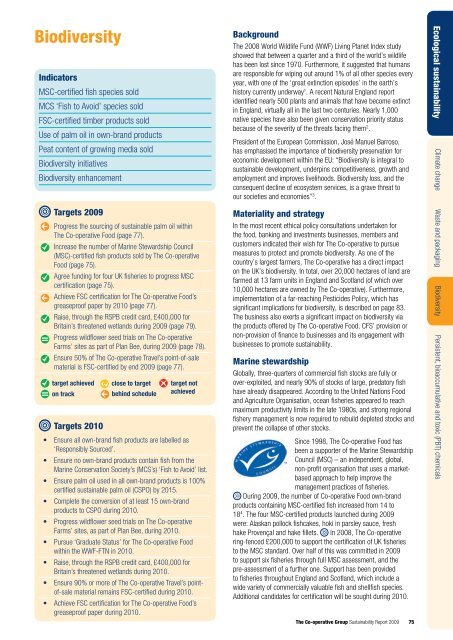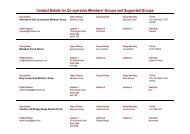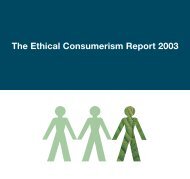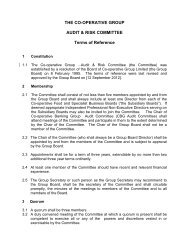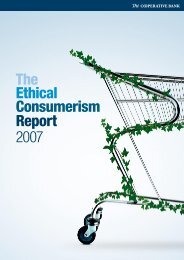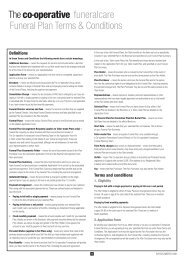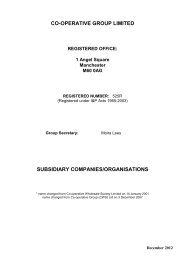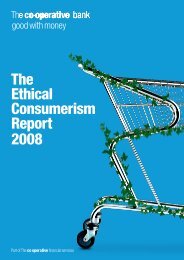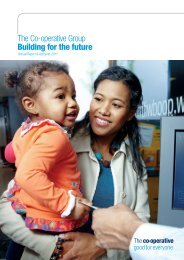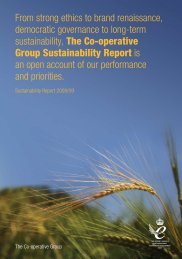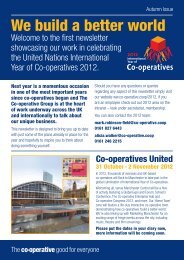Sustainability Report 2009 - The Co-operative
Sustainability Report 2009 - The Co-operative
Sustainability Report 2009 - The Co-operative
You also want an ePaper? Increase the reach of your titles
YUMPU automatically turns print PDFs into web optimized ePapers that Google loves.
Biodiversity<br />
Indicators<br />
MSC-certified fish species sold<br />
MCS ‘Fish to Avoid’ species sold<br />
FSC-certified timber products sold<br />
Use of palm oil in own-brand products<br />
Peat content of growing media sold<br />
Biodiversity initiatives<br />
Biodiversity enhancement<br />
Targets <strong>2009</strong><br />
Progress the sourcing of sustainable palm oil within<br />
<strong>The</strong> <strong>Co</strong>-<strong>operative</strong> Food (page 77).<br />
Increase the number of Marine Stewardship <strong>Co</strong>uncil<br />
(MSC)-certified fish products sold by <strong>The</strong> <strong>Co</strong>-<strong>operative</strong><br />
Food (page 75).<br />
Agree funding for four UK fisheries to progress MSC<br />
certification (page 75).<br />
Achieve FSC certification for <strong>The</strong> <strong>Co</strong>-<strong>operative</strong> Food’s<br />
greaseproof paper by 2010 (page 77).<br />
Raise, through the RSPB credit card, £400,000 for<br />
Britain’s threatened wetlands during <strong>2009</strong> (page 79).<br />
Progress wildflower seed trials on <strong>The</strong> <strong>Co</strong>-<strong>operative</strong><br />
Farms’ sites as part of Plan Bee, during <strong>2009</strong> (page 78).<br />
Ensure 50% of <strong>The</strong> <strong>Co</strong>-<strong>operative</strong> Travel’s point-of-sale<br />
material is FSC-certified by end <strong>2009</strong> (page 77).<br />
target achieved<br />
on track<br />
Targets 2010<br />
close to target<br />
behind schedule<br />
target not<br />
achieved<br />
• Ensure all own-brand fish products are labelled as<br />
‘Responsibly Sourced’.<br />
• Ensure no own-brand products contain fish from the<br />
Marine <strong>Co</strong>nservation Society’s (MCS’s) ‘Fish to Avoid’ list.<br />
• Ensure palm oil used in all own-brand products is 100%<br />
certified sustainable palm oil (CSPO) by 2015.<br />
• <strong>Co</strong>mplete the conversion of at least 15 own-brand<br />
products to CSPO during 2010.<br />
• Progress wildflower seed trials on <strong>The</strong> <strong>Co</strong>-<strong>operative</strong><br />
Farms’ sites, as part of Plan Bee, during 2010.<br />
• Pursue ‘Graduate Status’ for <strong>The</strong> <strong>Co</strong>-<strong>operative</strong> Food<br />
within the WWF-FTN in 2010.<br />
• Raise, through the RSPB credit card, £400,000 for<br />
Britain’s threatened wetlands during 2010.<br />
• Ensure 90% or more of <strong>The</strong> <strong>Co</strong>-<strong>operative</strong> Travel’s pointof-sale<br />
material remains FSC-certified during 2010.<br />
• Achieve FSC certification for <strong>The</strong> <strong>Co</strong>-<strong>operative</strong> Food’s<br />
greaseproof paper during 2010.<br />
Background<br />
<strong>The</strong> 2008 World Wildlife Fund (WWF) Living Planet Index study<br />
showed that between a quarter and a third of the world’s wildlife<br />
has been lost since 1970. Furthermore, it suggested that humans<br />
are responsible for wiping out around 1% of all other species every<br />
year, with one of the ‘great extinction episodes’ in the earth’s<br />
history currently underway 1 . A recent Natural England report<br />
identified nearly 500 plants and animals that have become extinct<br />
in England, virtually all in the last two centuries. Nearly 1,000<br />
native species have also been given conservation priority status<br />
because of the severity of the threats facing them 2 .<br />
President of the European <strong>Co</strong>mmission, José Manuel Barroso,<br />
has emphasised the importance of biodiversity preservation for<br />
economic development within the EU: “Biodiversity is integral to<br />
sustainable development, underpins competitiveness, growth and<br />
employment and improves livelihoods. Biodiversity loss, and the<br />
consequent decline of ecosystem services, is a grave threat to<br />
our societies and economies” 3 .<br />
Materiality and strategy<br />
In the most recent ethical policy consultations undertaken for<br />
the food, banking and investments businesses, members and<br />
customers indicated their wish for <strong>The</strong> <strong>Co</strong>-<strong>operative</strong> to pursue<br />
measures to protect and promote biodiversity. As one of the<br />
country’s largest farmers, <strong>The</strong> <strong>Co</strong>-<strong>operative</strong> has a direct impact<br />
on the UK’s biodiversity. In total, over 20,000 hectares of land are<br />
farmed at 13 farm units in England and Scotland (of which over<br />
10,000 hectares are owned by <strong>The</strong> <strong>Co</strong>-<strong>operative</strong>). Furthermore,<br />
implementation of a far-reaching Pesticides Policy, which has<br />
significant implications for biodiversity, is described on page 83.<br />
<strong>The</strong> business also exerts a significant impact on biodiversity via<br />
the products offered by <strong>The</strong> <strong>Co</strong>-<strong>operative</strong> Food, CFS’ provision or<br />
non-provision of finance to businesses and its engagement with<br />
businesses to promote sustainability.<br />
Marine stewardship<br />
Globally, three-quarters of commercial fish stocks are fully or<br />
over-exploited, and nearly 90% of stocks of large, predatory fish<br />
have already disappeared. According to the United Nations Food<br />
and Agriculture Organisation, ocean fisheries appeared to reach<br />
maximum productivity limits in the late 1980s, and strong regional<br />
fishery management is now required to rebuild depleted stocks and<br />
prevent the collapse of other stocks.<br />
Since 1998, <strong>The</strong> <strong>Co</strong>-<strong>operative</strong> Food has<br />
been a supporter of the Marine Stewardship<br />
<strong>Co</strong>uncil (MSC) – an independent, global,<br />
non-profit organisation that uses a marketbased<br />
approach to help improve the<br />
management practices of fisheries.<br />
During <strong>2009</strong>, the number of <strong>Co</strong>-<strong>operative</strong> Food own-brand<br />
products containing MSC-certified fish increased from 14 to<br />
18 4 . <strong>The</strong> four MSC-certified products launched during <strong>2009</strong><br />
were: Alaskan pollock fishcakes, hoki in parsley sauce, fresh<br />
hake Provençal and hake fillets. In 2008, <strong>The</strong> <strong>Co</strong>-<strong>operative</strong><br />
ring-fenced £200,000 to support the certification of UK fisheries<br />
to the MSC standard. Over half of this was committed in <strong>2009</strong><br />
to support six fisheries through full MSC assessment, and the<br />
pre-assessment of a further one. Support has been provided<br />
to fisheries throughout England and Scotland, which include a<br />
wide variety of commercially valuable fish and shellfish species.<br />
Additional candidates for certification will be sought during 2010.<br />
<strong>The</strong> <strong>Co</strong>-<strong>operative</strong> Group <strong>Sustainability</strong> <strong>Report</strong> <strong>2009</strong> 75<br />
Ecological sustainability Climate change Waste and packaging Biodiversity Persistent, bioaccumulative and toxic (PBT) chemicals


